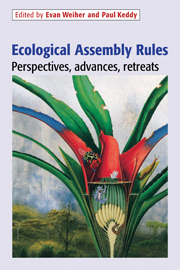Book contents
- Frontmatter
- Contents
- List of Contributors
- Introduction: The scope and goals of research on assembly rules
- Part I The search for meaningful patterns in species assemblages
- Part II Other perspectives on community assembly
- 8 On the nature of the assembly trajectory
- 9 Assembly rules as general constraints on community composition
- 10 A species-based, hierarchical model of island biogeography
- 11 Interaction of physical and biological processes in the assembly of stream fish communities
- 12 Functional implications of trait–environment linkages in plant communities
- 13 When does restoration succeed?
- 14 Epilogue: From global exploration to community assembly
- Index
14 - Epilogue: From global exploration to community assembly
Published online by Cambridge University Press: 04 September 2009
- Frontmatter
- Contents
- List of Contributors
- Introduction: The scope and goals of research on assembly rules
- Part I The search for meaningful patterns in species assemblages
- Part II Other perspectives on community assembly
- 8 On the nature of the assembly trajectory
- 9 Assembly rules as general constraints on community composition
- 10 A species-based, hierarchical model of island biogeography
- 11 Interaction of physical and biological processes in the assembly of stream fish communities
- 12 Functional implications of trait–environment linkages in plant communities
- 13 When does restoration succeed?
- 14 Epilogue: From global exploration to community assembly
- Index
Summary
In accordance with the plan laid down, we proceed to the consideration of follies into which men have been led by their eager desire to pierce the thick darkness of futurity.
Charles Mackay (1841)Introduction
The editors of a symposium volume are allowed to frame the question, choose the participants, contribute their own chapter, and offer opinions on drafts of each chapter. In this sense, they are like hosts at a party: they already own the house, and so should attempt to remain in the background, introduce the guests as they arrive, serve drinks and snacks unobtrusively, occasionally intervene if there are awkward periods of silence, and ensure that, in the end, the guests find their own coats and car keys and leave in a good humor. In general, then, it is probably unwise for editors to also presume to add commentaries, conclusions, or, as in some cases, multiple chapters. They risk becoming like the unfortunate host, who, having indulged too freely in his own liquor and become intoxicated with his own importance, proceeds to bore everyone with loud opinions on every topic that arises. In assuming the role of hosts, our intention was to remain sober, restricting ourselves to an introduction and a single contributed chapter. The purpose of the volume, after all, was to present a variety of views, not, like the over-refreshed host, to force readers to accept ours.
- Type
- Chapter
- Information
- Ecological Assembly RulesPerspectives, Advances, Retreats, pp. 393 - 402Publisher: Cambridge University PressPrint publication year: 1999
- 3
- Cited by

